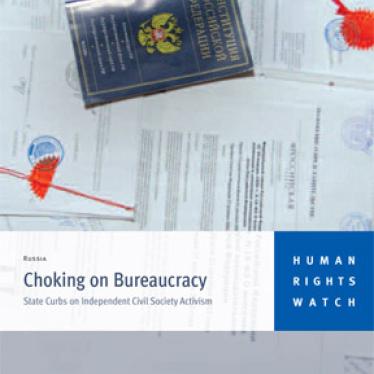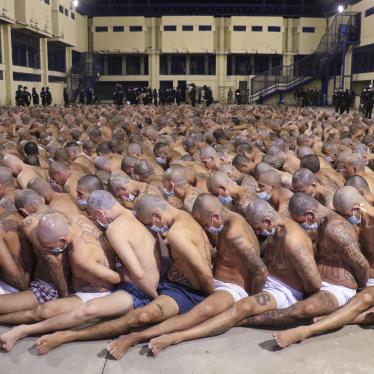July 13, 2012 Update
(Moscow) - This afternoon, the lower chamber of the Russian Parliament adopted in third and final reading the new restrictive NGO law. There is little doubt that the upper chamber of the Parliament, Federation Council, and Russia’s president will endorse it promptly. The law, which was supported by 374 members of the State Duma with only three deputies voting against it and one abstaining, is expected to come into force later this year (120 days after its official publication). The new regulations will not apply to religious organizations, NGOs created with the participation of state agencies, charity groups, scientific, cultural, and health associations. It is evident that advocacy groups, including human rights organizations, are the primary target of this draconian legislation, which will require them to register as “foreign agents.”
-----------------------------------
(Moscow, July 5, 2012) – Russia’s State Duma should firmly reject proposed restrictive amendments to the legislation regulating nongovernmental organizations that would brand all foreign-funded groups as foreign “agents,” Human Rights Watch said today at a joint press-conference with leading Russian human rights groups. The new draft, which was introduced to the lower chamber of the Russian parliament on June 29, 2012, would result in severe deterioration of the working climate for Russian civil society organizations.
The draft was sponsored by a group of deputies from the ruling United Russia party, which is currently headed by the Russian prime minister, Dmitry Medvedev.
“This draft seeks to marginalize and discredit foreign-funded groups that advocate for change in Russia,” said Rachel Denber, deputy director for Europe and Central Asia at Human Rights Watch. “It runs counter to the government’s repeated promises to improve conditions for civil society and to Russia’s international obligations on freedom of association.”
Human Rights Watch said that Prime Minister Medvedev, who embraced human rights rhetoric during his presidency, should instruct his United Russia party to withdraw the law from consideration in its current form.
The draft law equates receiving any foreign funding with being an agent of foreign interests. If adopted, it would also reinforce state control over Russian nongovernmental organizations (NGOs) receiving foreign funding as well as over representative offices of foreign and international organizations active in the country.
The draft “Introducing Amendments to Legislative Acts of the Russian Federation in Part Regulating Activities of Non-commercial Organizations, which Carry Out Functions of Foreign Agents” requires all NGOs that are receiving or planning to receive foreign funding to register with the Ministry of Justice as “carrying out functions of a foreign agent” if they are engaged in “political activities.” Its definition of political activities includes acts that are done routinely by NGOs engaged in advocacy such as advocating for policy changes or trying to influence public opinion.
Foreign-funded NGOs and foreign groups would be required to clearly identify themselves as “foreign agents” in public presentations, and on all publications and websites. NGOs defined by the draft as “foreign agents” could be suspended for up to six months, by simple decision of the authorities without a court order, if they fail to register as “foreign agents.”
The draft’s author, Alexander Sidyakin, a member of the Duma for United Russia, argued in the Russian media that the draft was aimed at “ensuring transparency” and would “by no means interfere with [NGO] activities.”
“The wording ‘foreign agent’ has a clearly negative connotation in Russia that can only be taken to mean ‘foreign spy,’” said Denber. “The impact of this law, which the drafters must realize, would be to single out foreign-funded groups and demonize them in the public eye.”
Sidyakin was also the official author of the recent amendments to the law that imposed increased restrictions on public rallies in Russia, which were adopted by the Parliament and signed by President Vladimir Putin with extraordinary speed in June this year.
“When Vladimir Putin returned as Russia’s president this past spring, we urged him to show sincerity about democratic reforms and his commitment to Russia’s international human rights obligations by taking concrete steps to foster a normal working climate for the civil society,” said Denber. “However, President Putin demonstrated quite the opposite by supporting legal initiatives of the ruling party that appear designed to suppress independent civil activity.”
Russian media is reporting that the Kremlin is planning to have the “foreign agents” regulations adopted just as speedily as the new “rally law.” Numerous media reports quote “sources” from President Putin’s office asserting that the draft law will pass all the requisite three readings in the State Duma and be endorsed by the Federation Council in July, before the Parliament goes on summer break.
Human Rights Watch said that if it were adopted in its current form, the draft law would expand already extensive and intrusive state control over organizations that receive foreign funding and over foreign NGOs. Those groups would have to commission costly, full audits annually, report on substantive work twice a year, and report on financial activities on a quarterly basis.
The actual reporting forms will be developed by relevant authorities. Human Rights Watch said that judging by past experience, they are likely to be detailed and burdensome.
In addition, special reporting requirements and control measures will apply to all wire transfers valued above 200,000 rubles (US$6194) received by NGOs from foreign sources. The law provides for no limitation on the number of ad hoc checks and audits that the Ministry of Justice and other state agencies could carry out in relation to foreign-funded NGOs and foreign groups.
At the same time, harsh sanctions are proposed for non-compliance with relevant regulations by both organizations and their leaders: fines of up to 50,000 rubles for individuals and up to 1,000,000 rubles for NGOs for failure to submit periodic reports and other information; fines of up to 500,000 rubles for individuals and up to 1,000,000 rubles for organizations for failure to register as a “foreign agent”; a criminal penalty of up to two years of custody for individuals in charge of organizations that allow serious breaches of the “foreign agents” regulations.
Human Rights Watch said the new draft continued a wave of restrictions on NGOs started by Putin in 2005 in response to the so-called “colored revolutions.” At that time, the Russian government increased scrutiny and control over Russia's vibrant civil society, by, for example, adopting regulations that increased the bureaucratic burden on NGOs which gave the authorities broad powers to interfere with their work. One of the key measures adopted in this respect was the 2006 NGO law, which brought strong international criticismupon Russia because of its excessively restrictive nature.
The Russian government responded to the criticism of the 2006 NGO law by arguing that it was merely regulating NGOs in the way any other state would. The official response to the criticism of the new draft legislation is similar.
“Any state has the right to regulate, and even set restrictions on, NGOs,” said Denber. “But to be compatible with international law these restrictions must be proportionate, necessary for a democratic society, and must pursue a legitimate aim. The 2006 law didn’t meet this test and neither does the current draft.”
Human Rights Watch’s reports “Choking on Bureaucracy: State Curbs on Independent Civil Society Activism” and “An Uncivil Approach to Civil Society: Continuing State Curbs on Independent NGOs and Activists in Russia” found that the 2006 law breached article 11 of the European Convention on Human Rights, which guarantees the right to freedom of association, and ran contrary to the Council of Europe’s Fundamental Principles on the Status of Non-governmental Organizations, which sets out best practices for the regulation of NGOs.
In its 2009 conclusions, the Expert Council on NGO Law — a body created under the auspices of the Council of Europe Conference of International NGOs to evaluate the conformity of member states’ NGO-related laws and practices with Council of Europe standards and European practice — criticized various aspects of Russia’s NGO regime, concluding that it “needs to be seriously simplified and built on straightforward bases.”
Human Rights Watch also found that the 2006 law was applied selectively to those NGOs which the government treated as “subversive,” including Russian human rights organizations, which are largely foreign funded. The organization also noted that the Russian government used a variety of other measures such as arbitrary tax, labor, and fire inspections, and anti-extremism legislation to harass civil society groups working on controversial issues.
“The new draft tightens already excessive restrictions and controls for foreign-funded groups,” said Denber. “This is clearly contrary to Council of Europe standards.”
When promoting the new regulations, their advocates refer, in particular, to their alleged similarity to the US Foreign Agent Registration Acts (FARA), however Human Rights Watch said these assertions are disingenuous. FARA covers those organizations and individuals that operate “under direction and control of a foreign principle.” It does not apply to NGOs that simply benefit from foreign funding and seek policy changes.
Nor does FARA impose a heavy burden of financial and other reporting on registered “agents of foreign principles.” FARA relates to a small set of institutions and individuals who operate at the behest of foreign entities, and its effects on those entities are minimal. Russia is using the existence of this US law inappropriately to justify the newly proposed restrictions on NGO work for domestic and international audiences, Human Rights Watch said.
Human Rights Watches urges Russia’s international partners, especially the United States and the EU, to call on the Kremlin in one voice, without delay, to clearly and publicly withdraw its support and distance itself from the draconian draft law.







